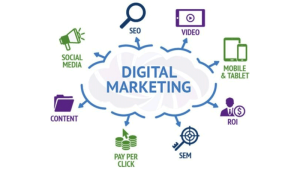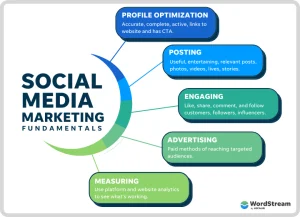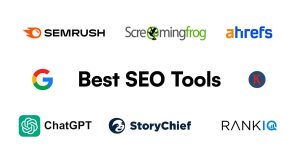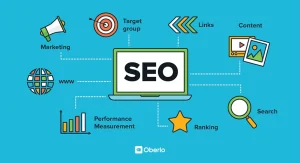Digital Marketing for Modern Audiences
"Choosing the Right Digital Marketing Software: A Guide to Engaging Modern Audiences Effectively"

Digital Marketing for Modern Audiences: Navigating Success with the Right App or Software
Digital marketing has evolved dramatically in recent years. Today’s audiences expect personalization, responsiveness, and seamless interactions across multiple platforms. Businesses that recognize this trend have turned to digital marketing tools and software to streamline their efforts and deliver on these expectations. If you’re looking for an efficient way to approach digital marketing, choosing the right software can significantly enhance your reach, engagement, and conversion rates. Here, we’ll explore the features, benefits, and best practices for using digital marketing software to engage modern audiences effectively.


Why Digital Marketing Software?
Digital marketing software encompasses various applications designed to help businesses manage campaigns, reach target audiences, analyze data, and enhance engagement. These tools simplify what could otherwise be a highly complex process, enabling companies to:
- Reach a Wider Audience: Digital marketing software can place your brand across social media, email, and other digital channels, allowing you to connect with your target audience efficiently.
- Analyze Campaign Performance: With built-in analytics and reporting, these tools provide detailed insights into campaign effectiveness, audience behavior, and engagement metrics.
- Automate Repetitive Tasks: Automation tools save time by handling tasks like email marketing, social media scheduling, and data reporting, allowing teams to focus on strategic goals.
- Personalize Audience Experiences: Many digital marketing tools come with features for personalization, enabling brands to deliver messages tailored to the specific interests of their audience.
Key Features of Top Digital Marketing Software
Understanding the core features of digital marketing software can help you select the right tools for your business. Below are some of the most essential features offered by digital marketing apps:
- Social Media Management: Digital marketing software typically offers tools to schedule, post, and monitor social media interactions across various platforms from a single dashboard. Social media management features can help you respond quickly to followers, analyze engagement trends, and maintain a consistent posting schedule

- Email Marketing AutomationEmail marketing is an incredibly powerful channel for reaching customers directly. In fact, many digital marketing platforms now offer email automation features, which enable you to create targeted campaigns, segment your audience, and monitor open and click-through rates with ease. By using these automation features, you can foster stronger relationships with your customers and, as a result, drive higher conversion rates.

- SEO Tools: Search engine optimization (SEO) is crucial to ensuring that your content reaches the right audience. Advanced digital marketing software often includes SEO features to help optimize your content for search engines. This may include keyword research tools, on-page optimization suggestions, and backlink analysis.


- Analytics and Reporting: The ability to measure campaign performance is invaluable. Analytics tools help you track metrics like website traffic, conversion rates, and audience demographics. This information allows you to adjust your strategy based on data-driven insights.
- Content Management: Many digital marketing tools integrate with content management systems (CMS) or offer in-built content management features. This can make it easier to create, edit, and manage blog posts, articles, and other media, ensuring your content is optimized for SEO and formatted correctly for various platforms.
- Lead Management and CRM: A strong customer relationship management (CRM) system helps manage customer data and track leads. This is essential for sales teams, as it allows them to prioritize leads and nurture customer relationships effectively.
Incorporating Affiliate Marketing into Your Digital Marketing Strategy
Affiliate marketing is not just an added revenue stream; it’s a smart way to reach wider audiences through partnerships and leverage existing online communities. By using digital marketing software with built-in affiliate management tools, businesses can streamline their affiliate program, track performance, and manage partnerships effectively. Many digital marketing platforms offer features specifically for affiliate marketing, such as customized referral links, automated commission tracking, and reporting tools that provide insights into affiliate-driven traffic and conversions.
For businesses, this approach means a cost-effective way to boost visibility and sales while building mutually beneficial relationships. Affiliates can promote products or services in ways that feel organic and authentic to their audience, increasing the likelihood of conversions. With the right digital marketing software, managing an affiliate program becomes simpler, giving you a powerful way to diversify your marketing efforts and extend your brand’s reach.
Benefits of Using Digital Marketing Software for Modern Audiences
Digital marketing software offers specific benefits for reaching today’s audience, whose expectations are higher and more defined than ever. Here’s how using digital marketing software can benefit your brand:
1. Enhanced Personalization
Modern audiences appreciate brands that understand their needs and preferences. Digital marketing software helps brands achieve personalization at scale, creating tailored content, emails, and offers that resonate with individual customers. This personal touch can significantly improve customer loyalty and engagement.
2. Real-Time Insights
With access to real-time data, businesses can quickly adapt their strategies based on how audiences respond. For example, if an email marketing campaign isn’t performing as expected, marketers can use analytics to identify issues and adjust their approach. This agility is crucial in a digital landscape that changes rapidly.
3. Greater Efficiency Through Automation
Automating repetitive tasks saves time and reduces human error, freeing marketing teams to focus on creativity and strategic decision-making. By scheduling posts, automating emails, and setting up automatic reports, marketers can improve productivity and ensure that campaigns run smoothly.
4. Improved Customer Relationship Management
Digital marketing tools with CRM capabilities help brands manage interactions with customers more effectively. By having all customer data in one place, marketers can see each customer’s journey, allowing them to craft more effective messaging and follow-up strategies. This leads to stronger customer relationships and higher retention rates.
5. Increased Reach Across Platforms
Today’s consumers interact with brands across multiple digital channels. A digital marketing tool that supports omnichannel marketing enables you to reach customers where they spend the most time. For example, a well-rounded digital marketing tool might support social media, email, and website advertising, giving you multiple points of contact with your audience.
Best Practices for Using Digital Marketing Software
Using digital marketing software effectively requires a strategy tailored to your audience. Here are some best practices to get the most out of these tools:
1. Define Your Objectives
Before implementing any digital marketing software, clearly define your objectives. Whether your goal is to increase website traffic, improve lead generation, or boost social media engagement, knowing what you aim to achieve will help you measure the success of your efforts accurately.
2.
Choose the Right Tools for Your Audience
Not every digital marketing tool will suit every business, so it’s essential to carefully consider factors like your audience demographics, industry, and specific marketing needs. For instance, if your audience is highly active on social media, then prioritize tools that offer strong social media management features. By aligning your tools with your audience’s preferences, you can increase the chances of meaningful engagement.
3.Optimize Content for Different Platforms
Since modern audiences interact with content across various platforms, each platform has unique requirements to consider. Therefore, customize your messaging for each platform while maintaining a consistent brand voice. This approach not only enhances engagement but also boosts the effectiveness of your campaigns.
4. Use Data to Refine Your Approach
Most digital marketing software offers analytics, which provides valuable data about your campaigns. Use this data to refine your approach, identifying what works and where there’s room for improvement. For example, if certain keywords or visuals lead to better engagement, incorporate those insights into future campaigns.
5. Focus on Building Relationships
Marketing is no longer just about promoting products; it’s about building relationships. Use digital marketing tools to engage customers, respond to their queries, and show genuine interest in their feedback. This relationship-building approach fosters loyalty and can lead to repeat customers.
Top Digital Marketing Software Solutions for 2024
Here are a few top digital marketing software options worth considering:
- HubSpot: Known for its user-friendly interface, HubSpot offers a complete suite for inbound marketing, covering CRM, email marketing, social media, and analytics.
- Buffer: Ideal for social media marketers, Buffer provides a simple way to manage multiple social media accounts, schedule posts, and measure performance.
- Mailchimp: A leader in email marketing, Mailchimp offers automation, segmentation, and analytics tools that are essential for effective email campaigns.
SEMrush:
A comprehensive tool for SEO, SEMrush helps businesses improve their search engine rankings through keyword research, site audits, and competitor analysis. 
- Salesforce Marketing Cloud: With robust CRM and lead management features, Salesforce Marketing Cloud helps businesses manage customer relationships, making it ideal for B2B marketers.



